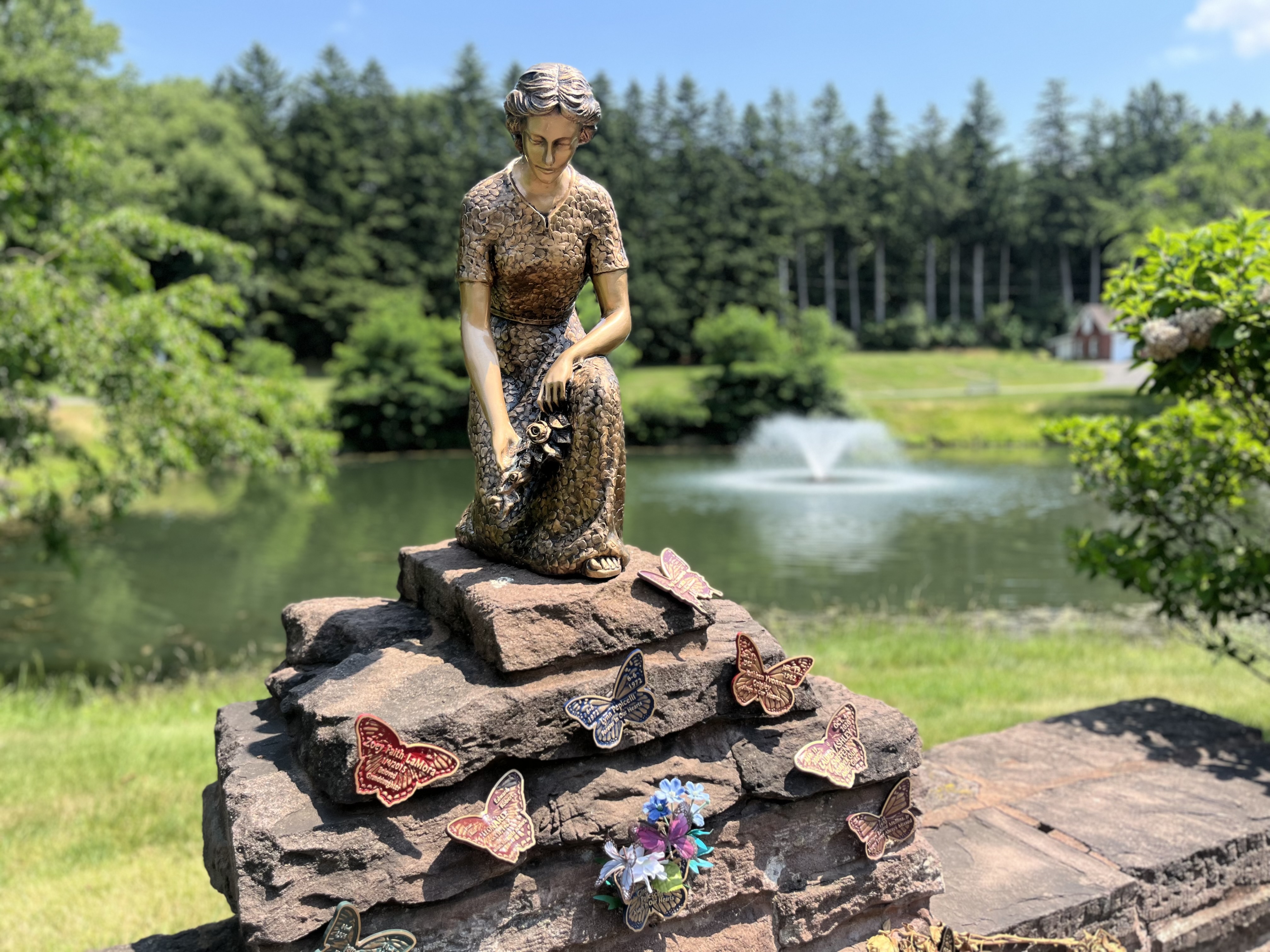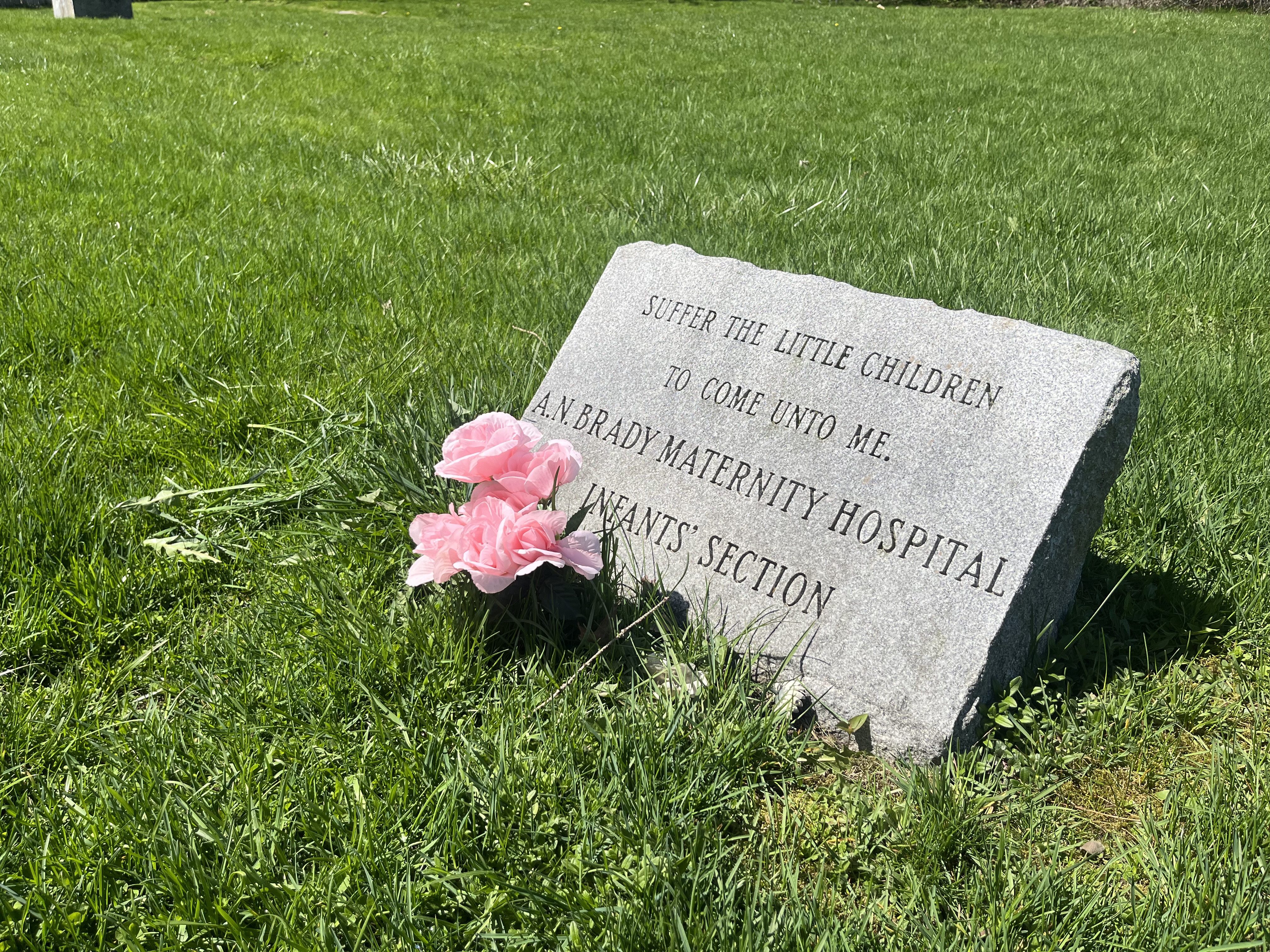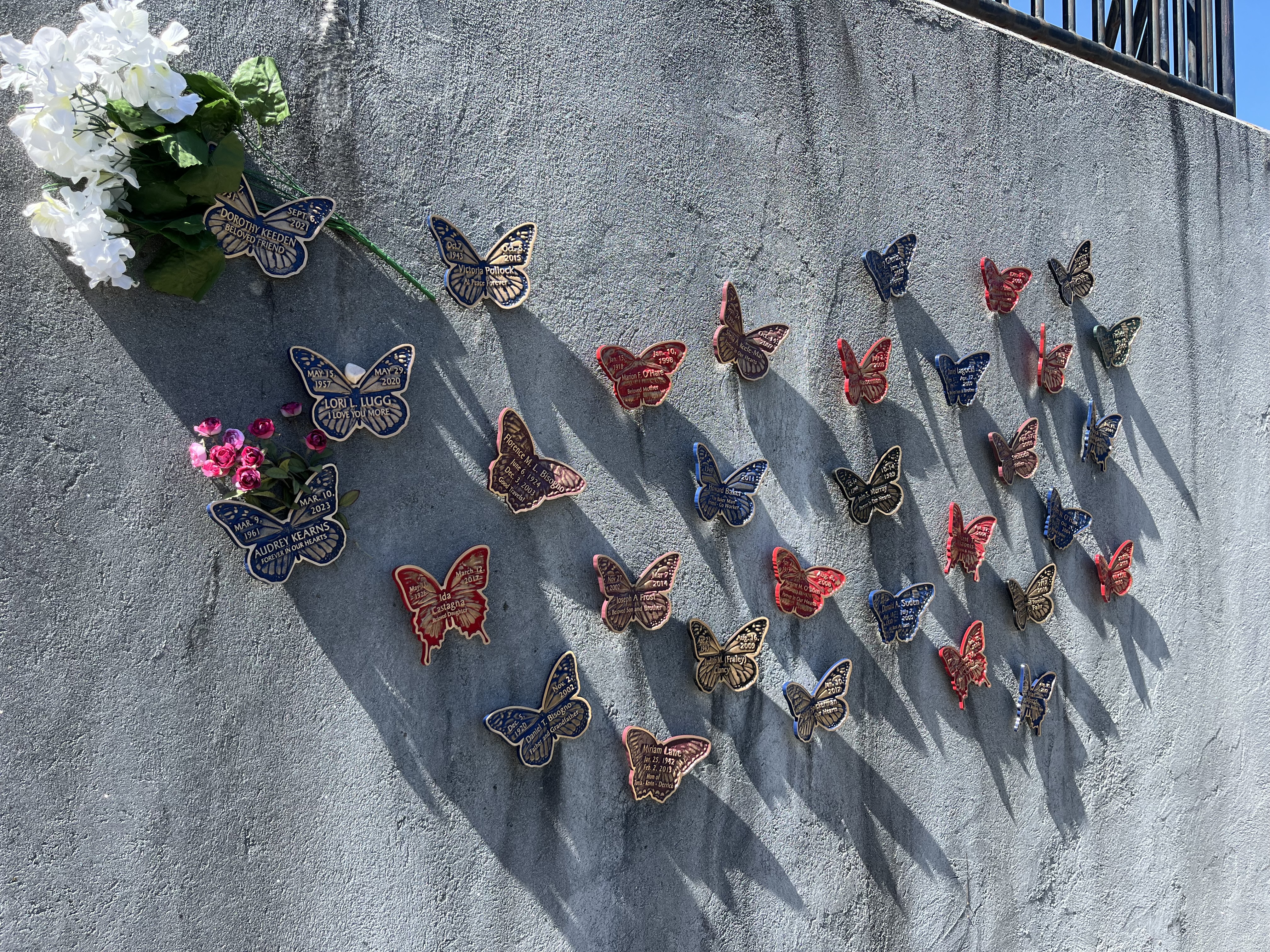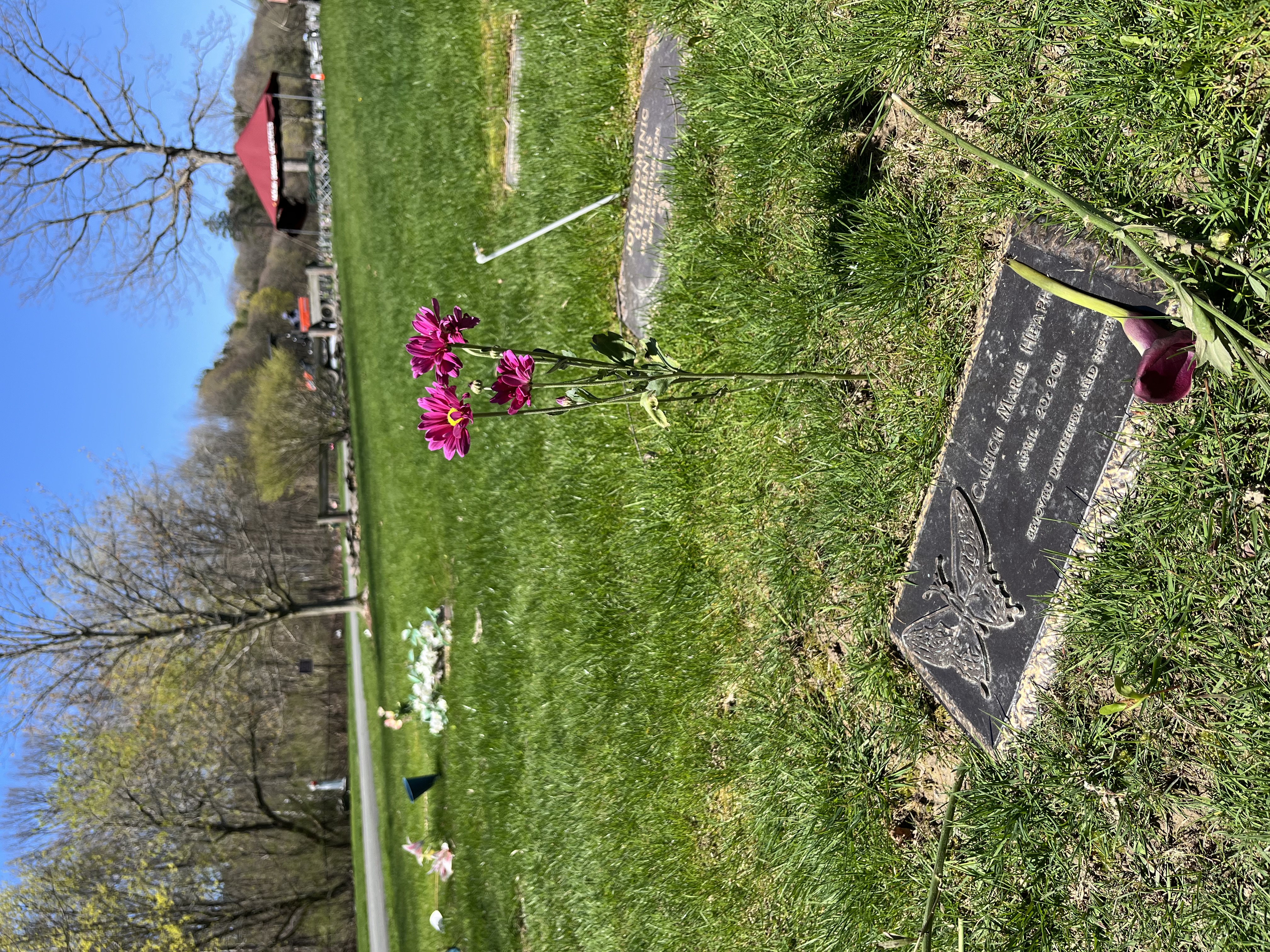June 26, 2024 at 12:56 p.m.
HOPE FOR HEALING
Two ushers in red jackets walk gently through the aisles of St. Paul the Apostle Church in Schenectady. They each carry a woven collection basket, extending the bins down the pews for attendees to drop pieces of paper into the pile.
But it’s not money being gathered tonight: Mass-goers have written down the names of babies who have died before, during or close to childbirth.
On March 20, dozens of families, women and couples sought healing at the Memorial Mass and Healing Liturgy, a Mass for those who have experienced a miscarriage, stillbirth or early infant death.
Father Matthew H. Frisoni, pastor at St. Paul the Apostle, presided over the Mass. During the liturgy, Father Frisoni prayed over the basket of names, which were kept and later added to the Easter fire during the Vigil Mass.
Some women attended on behalf of babies they have lost, others in honor of loved ones who are currently in pain. Katie Grogan and Shaunda Penny, the two women who helped organize the Mass, hoped the night would help anyone in mourning to find healing.
“You need that healing and those extra prayers, and just know that your baby mattered,” said Grogan, parish secretary for St. Gabriel the Archangel in Schenectady and youth minister at St. Paul the Apostle.

A statue at Most Holy Redeemer Cemetery in Niskayuna marks a memorial space and garden for babies lost to miscarriage, stillbirth or early infancy death. (Emily Benson photo)
The Mass is also the kickoff for a Miscarriage Ministry growing at St. Paul’s and — by means of Grogan and Penny — potentially more parishes. The two hope to offer emotional support and logistical guidance for women and families who’ve been touched by miscarriage. It’s a proactive approach, so if a miscarriage occurs, women are aware that funeral or memorial Masses are available for them, or that they can request their baby’s remains from the hospital for burial.
“There’s not a preparation period for (miscarriage), so if people don’t know what is available before they need it, the help won’t be there,” Penny said.
According to a report by the National Library of Medicine, it is estimated that between 10 and 28 percent of all recognized pregnancies end in pregnancy loss (miscarriage, stillbirth or ectopic pregnancy.) Studies also show pregnancy loss has been associated with a host of adverse physical and psychological impacts, including grief, depression and anxiety. Women who experience a pregnancy loss have also often reported dissatisfaction with clinical care following a loss, including a lack of care that focused on their emotional well-being.
Grogan and Penny started talking to parishes about miscarriage support at the start of the year after meeting through mutual friends in the fall. They make a good fit for each other: Grogan is a shy public speaker, and Penny is eager to take the microphone. Both are warm and funny, eager to listen to anyone who needs an ear to vent. They’re both mothers and active churchgoers, devout in their faith, families and friendships. And they’ve both dealt with the pain of miscarriage. Grogan lost three babies to miscarriage; Penny lost six. It’s why the two became trailblazers of this ministry, which does exist within the church but is seldom known about.
“I think people, societally, are all becoming more comfortable talking about our sufferings, and as that happens, talking about this becoming more normalized,” Penny said. “There are several celebrities who have talked about their miscarriages and their sufferings in their miscarriages, and just in general we’re starting to talk about this more.”

St. Agnes Cemetery in Menands houses multiple plot sections for infant loss, including a sign marking the burial plots of babies from Brady Maternity Hospital in Albany and a butterfly memorial wall. (Emily Benson photos)
The United States Conference of Catholic Bishops offers a prayer and blessing for parents who have experienced a miscarriage or stillbirth. Canon 1183.2 of the Code of Canon Law also states that “the local ordinary can permit children whom the parents intended to baptize but who died before baptism to be given an ecclesiastical funeral,” leaving much of the protocol up to the individual dioceses.
While the Albany Diocese offers various liturgical rites in the aftermath of miscarriage, both priests and laity are often still confused about what should be done. This is not from lack of care, but rather the outcome of the historical silence that has surrounded miscarriage for so long. The impact has left healing options not known and women and couples, often in the dark, without guidance when the unexpected occurs.
“Our priests work so hard and have so many responsibilities and they need to know so many things, and so I think for some, knowing how to handle this has fallen through the cracks,” Penny said. “We want to help them understand what they can offer to families as far as burial, and we would like to start support as a community.”
* * *
Penny, a parishioner at St. Paul the Apostle, lost her son, Francis, to a miscarriage in 2023. The mother of 13 children, Penny said her latest loss was the hardest to navigate.
“Three (miscarriages) were in a hospital setting, and there it was very easy to navigate,” Penny said. “I had three losses who were at home and … miscarrying at home, there was no funeral home involved with getting remains because I had them. It was extremely difficult to have any recognition of my babies while suffering the effects of miscarriage and blood loss and everything that goes with it, (while) trying to figure out what to do and how to do it.”
Penny sent a message to some moms who, like her, homeschool their children. She asked if any other women have also struggled with the logistical aftermath of miscarriage as a Catholic. She sent the email out and the responses started flooding back.

St. Agnes Cemetery in Menands houses multiple plot sections for infant loss, including a sign marking the burial plots of babies from Brady Maternity Hospital in Albany and a butterfly memorial wall. (Emily Benson photos)
“Stories from women having difficulties in having their babies buried or not knowing what to do,” she said. Some women said they weren’t aware a funeral or memorial Mass could be offered for their baby, others didn’t know what to do with their baby’s body. Some women have snuck into cemeteries to bury their babies, others still have the baby in their house, not sure what to do with the remains.
“These are people who are educating their children in the faith full-time,” Penny said. “These are people who are in the thick of the church and they still didn’t know what they could do.”
After emailing the homeschool group, Penny was told by mutual friends to talk to Grogan. By the fall of 2023, after her third miscarriage, Grogan had started reaching out to churches about starting miscarriage ministries herself.
Grogan, who had her first miscarriage in 2021, was left reeling from the experience. After miscarrying, Grogan underwent a dilation and curettage (D&C) to retrieve her baby at Albany Medical Center. Grogan requested to take home the remains for burial but was never given a clear promise that the removed remains were hers to keep.
Grogan was able to retrieve the remains, but jumping hurdles at the hospital just to retrieve her lost baby felt like salt in the wound. It left her hurt but also determined. She wanted to let women know that not only was it their right to request remains but that it was OK to advocate for that if necessary. Grogan also wanted to let families know that a memorial or funeral Mass for their child was an available option to offer closure.
“I had three miscarriages but …I had a funeral Mass and burial for each one, and I can tell you that really helped me with closure that I know where my babies are buried,” Grogan said.
* * *
Father Daniel Quinn, pastor of Blessed Sacrament Church in Albany, agreed that there is uncertainty amongst the clergy about how to offer support.
“There’s definitely confusion around it,” he said. “When we were in seminary, we didn’t cover something like that. What the procedure is for when someone dies is something you learn on the job. We learned how to celebrate a funeral Mass … (but) all that stuff a funeral home does isn’t a class in seminary, that’s the stuff you learn on the job at the parish. And it just never happened that any of these funerals were a miscarriage.”

Father Daniel McHale, pastor at St. Edward the Confessor in Clifton Park, agreed, noting that he didn’t recall any formal training for miscarriages in seminary. It was something he wasn’t aware of, but — much like Father Quinn and Father Frisoni — was eager to offer support once the issue was on his radar. Without anyone coming forward, it was hard to be aware of how many parishioners were being impacted.
“Society, up to very recently, has said this is an issue that’s dealt with in small family groups, not publicly,” said Father McHale. “But I think we need to say that women have the right to mourn the loss of their unborn baby, just the same as any other human loss would be mourned.”
Father Quinn hoped that by getting the word out more, families might be more comfortable approaching their priest about a Mass for their miscarried child.
“There’s a section in the funeral book for children, and there’s a subsection in the funeral book for children who weren’t yet baptized,” he said. “You can take that section … with prayers in it and have a Catholic funeral for a child who wasn’t baptized, or in this case, a child who wasn’t yet born. But if you have the remains and want to bury them, you can do that.”
* * *
For parents looking for resources, Albany Diocesan Cemeteries (www.capitaldistrictcemeteries.org) offers a variety of burial and memorial options for women who miscarry.
“A lot of women we work with haven’t gone to the hospital,” said Lori Biskup, Family Advisor at Albany Diocesan Cemeteries. “If they have a miscarriage at home, they’ll call us and ask us how we can help them and it’s treated the same as a fully formed body. With a miscarriage, you can go through a funeral director, some people do, and then there are others who will just preserve the remains and then get in touch with us (later) about options for burial.”
In 2013, Most Holy Redeemer Cemetery (below) in Niskayuna established the Remembrance Garden, a memorial space for those who have experienced the loss of a baby, be it by miscarriage or in early infancy.

St. Agnes Cemetery in Menands offers a butterfly memorial wall where families can purchase memorials in various colors of butterflies for a lost child. The cemetery also offers Rachel’s Garden, another memorial space for families who have lost children where they can pray and reflect.
“The infant lots are probably the most visited lots in our cemeteries,” said Kelly Grimaldi, historian and director of program and education development at Albany Diocesan Cemeteries. “The parents never forget these children. I’ve had people come and say it was 50 years ago when they lost a child and they still want to have that baby memorialized in some way.”
Biskup and Grimaldi hope that families understand their loss is no different than another’s pain.
Biskup herself had a miscarriage at Bellevue Hospital in Albany on New Year’s Eve in 1999. At the time, she didn’t know there were even options for bringing the baby’s remains to a cemetery. “I didn’t ask for the remains to be retained so I could do something and that’s a deep regret that I have,” she said. “There was no burial and no marker, and it’s hard.”
Blessed Sacrament Church recently began its own miscarriage ministry in June of last year, building an online resource guide on the parish’s website with the help of Mary (real name withheld for privacy) and parishioner Elise Harms. Mary was active in her parish and faith when she experienced a miscarriage.
“It was unexpected, and it was early, and that kind of made it more confusing,” she said.
She had her baby’s remains but wasn’t sure what to do with them or how she even could ask for help. “I was so mortified and there didn’t seem to be any information. One, you’re emotional and hormonal, and I was embarrassed to call anyone. I didn’t want to call my priest and say this happened and I don’t know what to do. I was nervous about being made to feel like I was making a big deal out of it because it was an early loss, and I didn’t know if anyone else did anything in the church for losses such as these. I couldn’t find anything online either.”
With little facts to go off, the couple buried their baby’s remains in the backyard.
“I was mortified to call a funeral home and say, here’s a gray blob,” she said. “And in the months and weeks following that, I remember it was the first time in my life being so angry, not only at God but at the church because of how many times I’ve heard of post-abortion ministries, but I have never once heard anyone mention anything about miscarriage, and it just felt really unbalanced.”
After her own experience, Mary wanted to offer a list of resources for women who went through the same struggles she did: A place where information was easily accessible, where she didn’t have to call a variety of places and keep recounting her story to figure out what to do.
The site (blessedsacramentalbany.org/programs/miscarriage-ministry) launched in the summer and offers a list of support programs available at Blessed Sacrament, including a meal delivery option orchestrated by Mary and Harms, burial and memorial options, and videos on the loss of a miscarriage.
“I’m at a point where it’s easier for me to list the women who haven’t had miscarriages because so many of them have,” Harms said. “But a lot of the time they didn’t know what resources were available. Like do I call my priest, do I call the church office about this? And there weren’t any resources they could find.”
“It’s my hope by doing this that people know their options,” Mary added.
* * *
In addition to education, Grogan and Penny want to offer the validation that a miscarriage is a loss for families.
“I think there is a sort of hierarchy of mourning, which is a weird thing to say,” Father McHale said. “If you had a father who died at 95, people would say sorry for your loss, but at the same time, he had a great life or a long life. But if your dad dies at 55, obviously, it’s a whole other conversation. And you might equally be mourning the loss of your father at both stages of life.”

After her first miscarriage, Grogan noted it was her church community that rallied around her.
“There were more people in my church community supporting us than my own family because a lot of my family were not really practicing, and they didn’t think of it as a loss,” Grogan said. “As embarrassing as it was and battling through those emotions, to see that support from my church family really helped.”
Penny recalled the handful of miscarriages she went through that she hadn’t even mentioned to friends or family. Those were the hardest ones, she said, the ones where you carry the weight alone: “Those times it was hidden, it was even harder because now you’re pretending.”
Even when help was there, the pain was still very real. Penny was on vacation in North Carolina when she had her last miscarriage. When she returned home, her friends had decorated her porch, including a card for remembering Francis, had a Mass said for him and stocked her fridge with food.
“I just thought, how many women miscarry and go back to work the next day and nobody even knows?” she said. “I am heartbroken and sad and struggling, and I had this. How much worse would it have been if I didn’t? I feel very strongly that I don’t want anyone to suffer alone.”
This is exacerbated by the cultural notion that pregnancy should be kept quiet until after the first trimester, when women are less likely to miscarry. “Women are told don’t tell anyone you’re pregnant the first trimester, and then when you do lose the baby, nobody knows because you couldn’t tell anybody you were pregnant,” Grogan added.
The issue, like so many things, is getting the word out. Father McHale noted how miscarriage is a pro-life issue, and for how much the church offers support to women who have undergone an abortion, that same support needs to be present for women who have lost miscarried babies.
“If we practice what we preach, that life is from conception until natural death, then we need to treat the death of a miscarried baby like the death of anybody else,” he said.
Added Penny: “We have some great priests doing some great things, and we just want everybody to know (what’s) available, and we want all the wonderful priests to know what’s available to them to administer to their flocks.”
MORE NEWS STORIES
- Interview with French Archbishop Verny, new president of the Pontifical Commission for the Protection of Minors
- San Antonio archdiocese calls for prayers as at least 20 girls missing from Christian camp following severe flooding
- Catholic novel reflects on the nature of work
- President Trump signs ‘Big Beautiful Bill’ into law July 4
- Wisconsin abortion ban, Big Beautiful Bill, care for creation Mass | Week in Review
- Washington Roundup: Trump bill passes; USAID closes; concerns rise over Russia religious persecution
- Jurassic World Rebirth
- F1 the Movie
- ‘Help us escape, we can’t live here,’ pleads Damascus priest after deadly attack
- A year later, first ‘perpetual pilgrims’ describe how Eucharistic pilgrimage changed their lives











Comments:
You must login to comment.